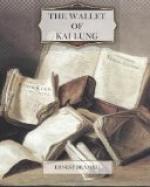Scarcely had Yang Hu made an end of speaking before there happened an event which could be regarded in no other light than as a direct answer to his plainly expressed request for a definite sign. Upon the clear air, which had become unnaturally still at Yang Hu’s words, as though to remove any chance of doubt that this indeed was the requested answer, came the loud beating of many very powerful brass gongs, indicating the approach of some person of undoubted importance. In a very brief period the procession reached the square, the gong-beaters being followed by persons carrying banners, bowmen in armour, others bearing various weapons and instruments of torture, slaves displaying innumerable changes of raiment to prove the rank and consequence of their master, umbrella carriers and fan wavers, and finally, preceded by incense burners and surrounded by servants who cleared away all obstructions by means of their formidable and heavily knotted lashes, the unworthy and deceitful Mandarin Ping Siang, who sat in a silk-hung and elaborately wrought chair, looking from side to side with gestures and expressions of contempt and ill-restrained cupidity.
At the sign of this powerful but unscrupulous person all those who were present fell upon their faces, leaving a broad space in their midst, except Yang Hu, who stepped back into the shadow of a doorway, being resolved that he would not prostrate himself before one whom Heaven had pointed out as the proper object of his just vengeance.
When the chair of Ping Siang could no longer be observed in the distance, and the sound of his many gongs had died away, all the persons who had knelt at his approach rose to their feet, meeting each other’s eyes with glances of assured and profound significance. At length there stepped forth an exceedingly aged man, who was generally believed to have the power of reading omens and forecasting futures, so that at his upraised hand all persons became silent.
“Behold!” he exclaimed, “none can turn aside in doubt from the deliberately pointed finger of Buddha. Henceforth, in spite of the well-intentioned suggestions of those who would shield him under the plea of exacting orders from high ones at Peking or extortions practised by slaves under him of which he is ignorant, there can no longer be any two voices concerning the guilty one. Yet what does the knowledge of the cormorant’s cry




